Japanese anime has never been so popular with fans all around the world as it is right now. This interview series takes a look at the behind-the-scenes stories and true feelings of those who actually produce anime in Japan and is being conducted in collaboration with international anime sites including Anime Anime, Tokyo Otaku Mode, and Chinese language outlet Bahamut.
Check out the rest of the interviews here.
******************************************
Created in 1979, the Gundam series has lived on for over 40 years and is one of the most iconic series in the anime industry. The series was created by Sunrise, which has its headquarters in Kamiigusa of Suginami Ward, Tokyo.
Ever since its establishment 46 years ago, the studio has offered countless masterpieces to the world. Love Live! and Code Geass are a few of their recent successful hits. The Gundam series also has a wide array of titles from Gundam Build Divers to Mobile Suit Gundam Narrative. In the summer of 2018, the announcement that the studio was to work together with the globally famous production company Legendary Entertainment for a live-action Hollywood film project took the world by storm.
How does Sunrise come up with and create each of their series? We asked Naohiro Ogata, the General Manager of the Executive IP Division Planning and Production Unit No. 1 and producer of Studio No.1, who has worked on titles such as Tales of the Abyss, Inuyasha: The Final Act, Mobile Suit Gundam Unicorn, Gundam Reconguista in G, and Mobile Suit Gundam Thunderbolt.
What are characteristics unique to Sunrise? What are its strengths? What are their plans for the future to connect with fans?
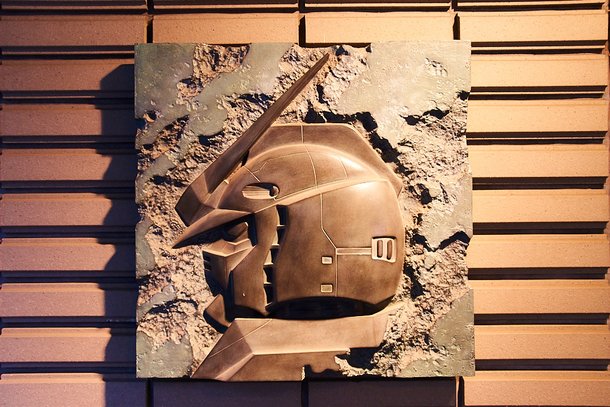
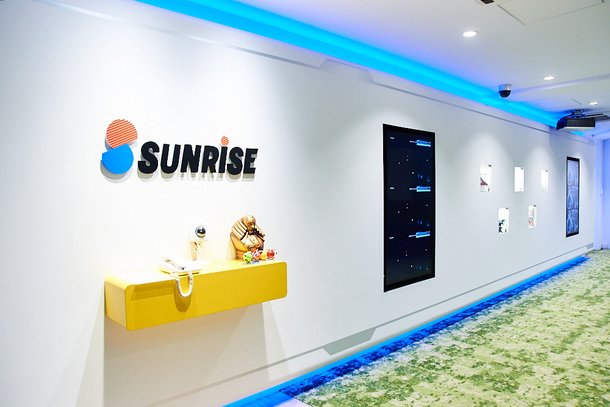
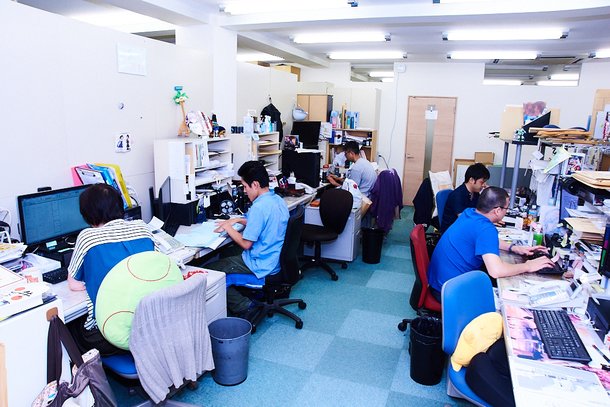
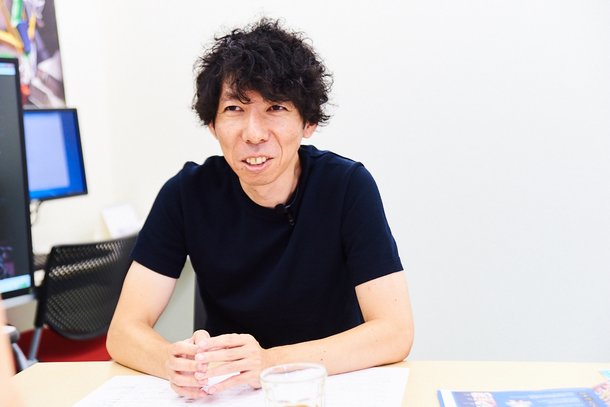
Creating Plans! How Sunrise Titles Are Created
- Can you tell us how Sunrise itself was founded?
Ogata: Since Sunrise is a studio that is over 40 years old, it has gone through many changes. I entered the company at the time Gundam Wing: Endless Waltz was being made in 1997, around 20 years ago.
The company was founded as Soueisha in 1972 and renamed Sunrise Japan in 1976 when it expanded its businesses. The Sunrise we have now was created in 1987. In 1994, the company joined the Bandai Namco Group, which was called the Bandai Group at the time, which was a large turning point.
- What was the company’s first title?
Ogata: The company received work from Toei Doga Co., Ltd. and Tohokushinsha Film Corporation in the beginning, but the very first original series was Invincible Super Man Zambot 3 which aired from 1977. Mobile Suit Gundam began airing in 1979.
- Sunrise has continued creating countless titles to this day. How are they planned?
Ogata: There are a few ways that plans and titles are created. The first way is creating them based on IPs which belong to the Bandai Namco Group, such as Gundam. The key lies in expanding the project using the group to distribute merchandising and video production.
There are also ways to create projects by working with companies outside the group, such as the recent Love Live! series. Another way is to create projects based on existing titles. Inuyasha was created this way by working with Shogakukan and Yomiuri TV. They are planned by studio producers who come up with how future projects are to be made by forming a team of creators who work to create projects that fulfill their goals.
- You brought up the Gundam series earlier. Is it difficult to create new projects that build upon well-known titles such as Gundam?
Ogata: Since Gundam is such a long-running series, there are traditions that need to be taken good care of. But this results in a fan base that grows older and older, making it difficult for younger viewers to join in. Mobile Suit Gundam: Iron-Blooded Orphans (hereinafter: IBO) and Gundam Build Divers (hereinafter: Build Divers) are titles that can be enjoyed by existing fans and function as entry points for a younger audience.
On the other hand, Mobile Suit Gundam Unicorn (hereinafter: UC) and Mobile Suit Gundam Narrative (hereinafter: NT), an upcoming movie scheduled for a theatrical release in November, are titles geared towards long-time fans.
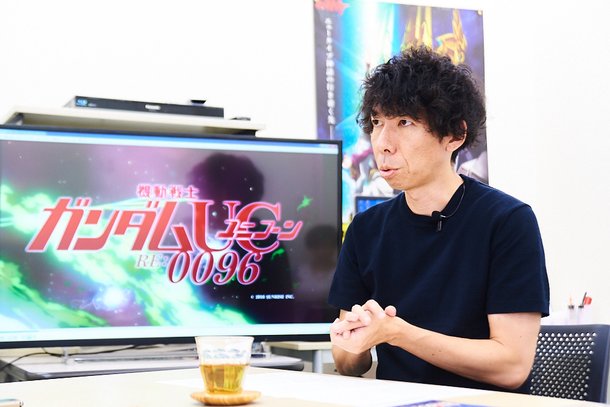
- I was surprised by the spectacular quality of UC, which you worked on. How did you manage to create such a groundbreaking series?
Ogata: UC began as a title that was theatrically released at events, but the complicated history of Gundam OVAs made it what it is. (laughs)
When I joined the company, it was working on OVA series such as Gundam Wing: Endless Waltz and Mobile Suit Gundam 08th MS Team. Before them were Mobile Suit Gundam 0080: War in the Pocket and Mobile Suit Gundam 0083: STARDUST MEMORY (hereinafter: 0083). They were masterpieces created by the most skilled of hands, and I was under an immense amount of pressure due to these predecessors. The creators of UC also knew that they couldn’t cut corners and make something sub-par.
- Do you think this spirit helps to support the Gundam brand to this day?
Ogata: I believe so. 0083 is still astounding to watch even to this day. it can’t be created by ordinary skills. It was made before the adoption of digital animation and was drawn on cels by hand.
- Love Live! is one of the latest original IP projects, as well as Code Geass, which began in 2006. How are projects like these created?
Ogata: My senior colleagues have taught me that Sunrise is a company that creates original titles, and the DNA of that spirit has become a part of me. I believe that becoming a full-fledged producer requires experience in planning and creating original series. Engaging in business while owning the rights to original titles is a feature unique to Sunrise.
Does the creative process begin with the producer creating plans and presenting them at meetings?
Ogata: There are times where that happens, or sometimes the director or creators come up with ideas they want to expand on. I believe that it is important that creators in Sunrise can have the chance to work on original titles of their own.
- You also mentioned that there are many projects based on existing materials.
Ogata: Yes, and they are actually very challenging to make. However, at Sunrise, we are taught to add a little something original to existing series, not just recreate them. For example, we try to put more effort into action scenes or dig deeper into certain parts of the story. We use methods similar to what we use to create our original titles.
Methods of depiction vary between manga and animation, and so we take good care of each of their differences, talk with the original creators and editors, and try to add aspects that are original to Sunrise.
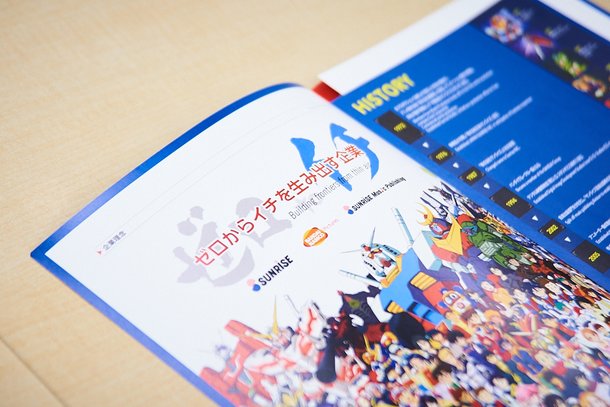
Their Strong Depictions of Mecha and the Challenge of CGI
- How many studios does Sunrise have now?
Ogata: There are a total of nine, including CGI studios.
- Are there nine including Bandai Namco Pictures (*1)?
Ogata: There are nine excluding Bandai Namco Pictures. Some studios work on multiple titles at the same time, such as Studio No.1, which works with two production lines (*2).
The nine studios at Sunrise are currently divided into the Planning and Production Unit No.1 and Planning and Production Unit No.2. I am in charge of No.1, and Tadashi Hirayama, the producer of the Love Live! series, is the general manager of No.2.
On the other hand, Bandai Namco Pictures has six studios named A, B, C, D, E, and F, as well as a studio in Osaka that handles digital image creation.
*1 Bandai Namco Pictures: A spin-off company which separated from Sunrise in 2015. Mainly focuses and excels at character merchandising for family audiences.
*2 Creation teams are made for each title at animation studios, and each team is called a production line.
- Are there different characteristics for each studio?
Ogata: There are many. Approximately ten studios have been constantly running for over ten years, and each one has their own defining features. Producers take the lead and decide the main staff for their projects and each one is separately financed, resulting in unique characteristics.
- Are there strong connections between each studio?
Ogata: We think of each other as competitors on good terms. I always keep a keen eye on titles made by other studios, and try to create even better titles by myself. I believe that this leads to our strength to create titles from a wide variety of genres, like Mobile Suit Gundam and Love Live!
In addition, being a member of the Bandai Namco Group allows for the titles to become video games and other merchandise by working with other companies in the group. This allows for a vast expansion for our business. It gives the titles created by our own hands the possibility to be shared globally, which makes them worth the effort.
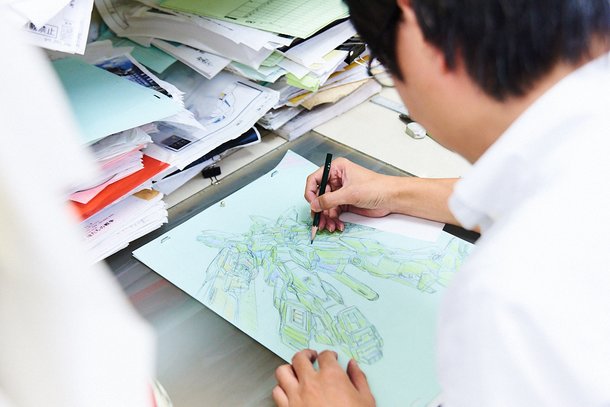
- It seems that the anime industry as a whole is adopting CGI technology. How has this affected the Sunrise studios?
Ogata: It varies from title to title. The D.I.D. Studio, a studio which focuses on CGI, works on all CGI related things for Mobile Suit Gundam THE ORIGIN, as well as Bandai Namco Pictures’ Aikatsu! and Battle Spirits titles. There are also CGI staff members who are stationed in studios for UC and NT, and we have even worked with other CGI production companies for Love Live! Right now, we change our CGI partners depending on the direction of each title.
- How much CGI is required for NT, which will be released soon? Are they used for the depiction of mechas?
Ogata: Mobile Suit Gundam THE ORIGIN is one of the only series which fully uses CGI for its battle scenes and the rest is hand-drawn. This is a characteristic of Sunrise and can be seen in titles from Studio No.1 which created UC, Gundam Reconguista in G, Mobile Suit Gundam Thunderbolt, and NT, as well as in Build Divers and IBO by Studio No.3, which are 90 percent hand-drawn.
The transformation scenes for the Unicorn Gundam in UC were created with CGI, but the other sections are all hand-drawn. Although I was the one who ordered this to be done, I am simply surprised with how well they were drawn. About half of NT was originally planned to consist of CGI, but ended up being mostly hand-drawn.
- Is there a reason why you put in this much effort into hand-drawn animation?
Ogata: Our creators want to do so. Even at a global scale, there are hardly any studios that can hand-draw mechas as well as Sunrise. There may be a few, but there aren’t many young animators who draw mechas, and there aren’t many companies that consistently offer mecha related jobs.
I personally enjoy watching hand-drawn mechas. This is the reason why I stick to this method, but there is a problem where most talented creators are now growing older and have physical limits. There is also a problem where there aren’t many people who can create the in-between animation (*3) for mecha animation. It is getting difficult to create hand-drawn animation, and the time has come to face these problems head-on. I believe that 3D CGI will become more prominent from now on, and hand-drawn resources will be used only when they are absolutely necessary.
*3 During the production of animation, inbetweening animators are tasked to draw images to fill in the movements drawn by key animators. These sections are known as in-between animation.
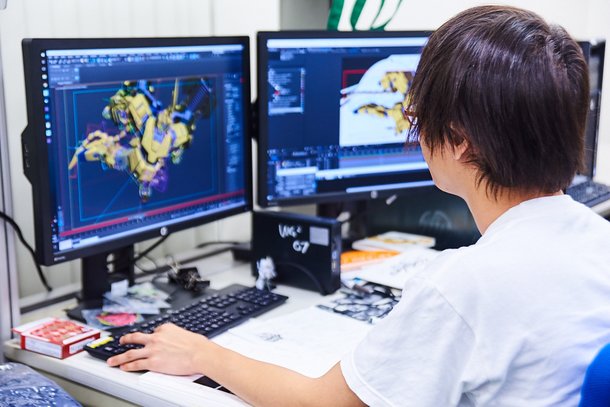
- You brought up something called the D.I.D. CGI studio earlier. What does it do and what is its history?
Ogata: It was originally created as Sunrise’s digital division in the 1990s. It began with creating Mobile Suit Gundam MS IGLOO and later became in charge of making the monitor screens and CGI cuts in Sunrise titles.
-Are there any plans to expand on this concept and create more fully CGI animated titles?
Ogata: Since I am from an older generation, hand-drawn animation feels right for me. However, current viewers from of younger generations feel almost to no hesitation when it comes to 3D CGI. I believe that large-scale titles for mass global audiences should actively incorporate a balanced amount of fully 3D CGI animation.
On the other hand, I don’t think that companies like Disney will attempt to create hand-drawn mecha anime. Our strength lies in the fact that we are at the top tier of this niche market.
- You said that there aren’t many people who can draw mecha animation. Do you have any countermeasures for this problem?
Ogata: The animation school which Sunrise created a while ago has re-opened this year. It is a project to nurture skills to the point of animation directing, character designing, and creating key animations, and its graduates are already working in the field, such as Sejoon Kim, who did the character designs for NT, and Yuhei Murota, who did the character designs for Love Live!
- What is the history behind the Sunrise Animation School?
Ogata: It succeeded in creating resources for six consecutive years from 2005 to 2011. It took a break after that, but with the recent lack of creators, it was decided that there was a need for an environment to nurture skills, so it restarted with Hirayama-san from Planning and Production Unit No. 2 as its headmaster. It is very important for the students of this school to create a new foundation for Sunrise, and the company wanted to help the new generation in some shape or form. We hope to nurture them so that they can become sustainable key animators after their school year.
- Do you think that creating a good environment is the key to good skills?
Ogata: Nurturing talent is a difficult task. However, Sunrise has many studios and titles which offer various chances for talented people.
- So people with skill and talent can learn at the school to widen their future prospects.
Ogata: It is extremely difficult for new animators to make a living. We support the students until they can sustain themselves and then offer chances through jobs on Sunrise titles.
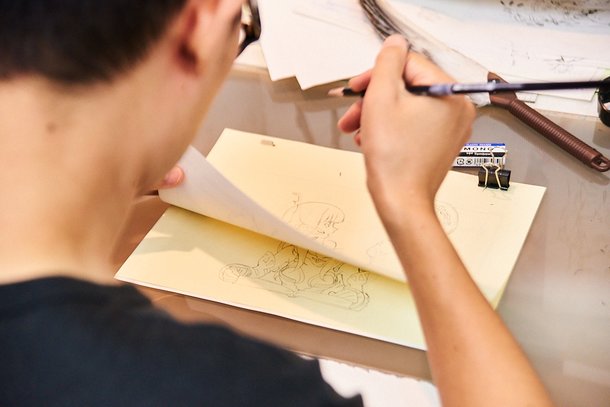
Aiming to Become a World-Famous Studio: Sunrise’s Global Expansion
- I'd also like to ask you about plans for markets overseas. For example, I’ve heard that Gunplas are gaining popularity.
Ogata: The Gundam series is gaining a lot of popularity in Asian regions thanks to its many fans overseas. Approximately 30 percent of all Gunplas are purchased in Asian regions outside of Japan. A Gunpla for Mobile Suit Gundam MOON has been released, and almost half of its pre-orders were from overseas. However, despite becoming popular in Asia, the series still has a long way to go when it comes to North America and Europe.
On my recent trip to America, I found out that human heroes gain popularity easier in the North American market, and felt that our task, as well as the task of Bandai Namco Group as a whole, is to find a way to create an audience for large robots and our video games in the North American and European regions.
- I heard that you went on stage for Anime Expo 2018 this summer. Were you able to receive the response you hoped for?
Ogata: With the success of UC and the streaming of IBO in North America, Gundam is gradually gaining popularity in the US. Even the record for Gunpla sales in North America was broken last year. We thought that fans in the US would prefer pre-assembled figures, but seeing the enthusiasm when Meijin Kawaguchi (Katsumi Kawaguchi of BANDAI SPIRITS and one of the pioneers of Gunpla making) came on stage, I felt that the passion for the series is the same in every country. Therefore I am positive that there is still room for the Gundam series to lay down its roots.
The live-action Gundam project with Legendary Pictures which was revealed at Anime Expo is also in the works. We would like to prepare to spread the Gundam series to the world with the Group by the time it comes to fruition.
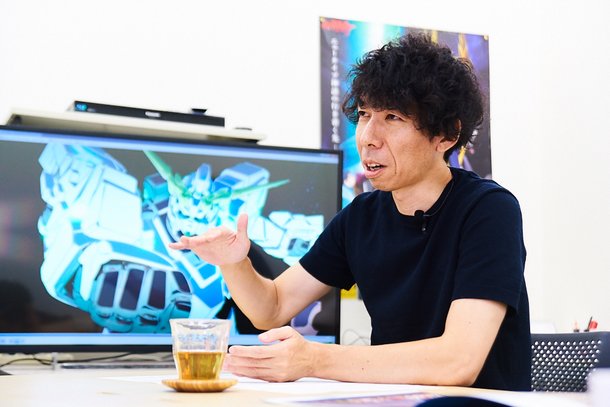
- On the topic of live-action movies, I noticed that a Gundam was featured in Ready Player One.
Ogata: We granted the license for the movie. The Gundam was fortunately used in an awesome way. I was able to see it at the premiere and was moved by it.
- There also seem to be plans for a live-action Cowboy Bebop project overseas. Is there a flow to create live adaptations of Sunrise titles?
Ogata: Cowboy Bebop has been very popular among fans overseas and we received a passionate request.
I believe that there aren’t any companies that have as many rights to anime IPs as Sunrise does. I also believe that there are possibilities that other titles may be able to expand overseas.
- This is another question about connections with countries overseas. About how many Sunrise employees are from foreign countries?
Ogata: As of now, there aren’t too many staff members who have come from overseas. Other animation companies usually work with production companies across the world, but everything is done in-house in Sunrise, so we have to make connections.
Despite our situation, there are members who have been fans of Sunrise that have joined the company. Sejoon Kim, the character designer for NT, has a Korean background and was an avid fan of director Yoshiyuki Tomino’s Invincible Super Man Zambot 3.
- I saw that Sunrise is recruiting new graduates as animators and production assistants. Are people from overseas able to apply?
Ogata: Yes, they are. People with foreign nationalities are free to apply. In fact, one of our newcomers this year is already part of a certain production team.
- It may be difficult for fans overseas to support for Japanese anime, but what are the best ways to show support to studios?
Ogata: Nowadays, Twitter and other social media platforms are the best way to show us support. Another way is to buy Gunplas. I especially felt the support the other day when there was a long line waiting to buy a limited edition Sazabi being sold in Hong Kong.
I believe that creating communities to make connections between fans overseas is the key to our future. I’ll do my best.
ーFinally, can we receive a message for our overseas fans?
Ogata: Sunrise is domestically known as a company that makes original titles such as Mobile Suit Gundam and Love Live! We would like to expand this recognition to the world. We want to become known as much as Marvel and Disney are. Therefore we would like to compete in the global market with our upcoming titles, including the live-action Gundam project with Legendary Pictures.
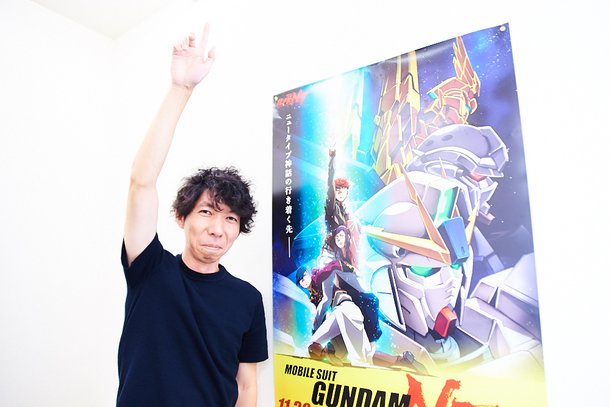
This project also includes fan participation, featuring Otaku Coin, a community currency which is set to launch this fall. The aspirations of Otaku Coin are to connect Japanese otaku culture fans and creators throughout the world and to create a community that transcends borders with a community currency.
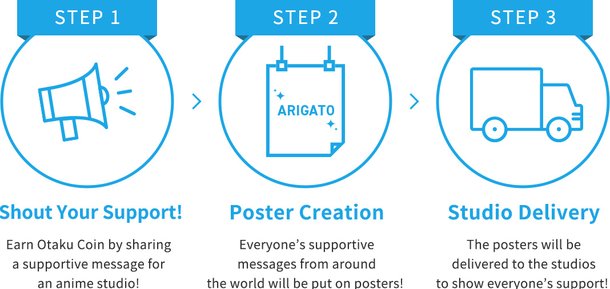
In collaboration with that, fans who read these articles will be able to use the Otaku Coin Official App to send the studios messages of support and gratitude. The support project will launch at the same time as the app in fall 2018. Please subscribe to the Otaku Coin mail magazine to receive the latest information and updates.

 Shopping Guide
Shopping Guide
















